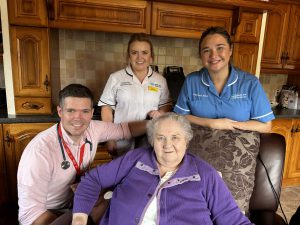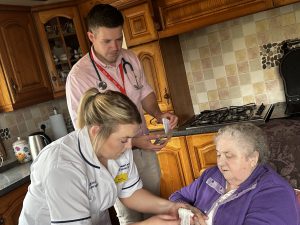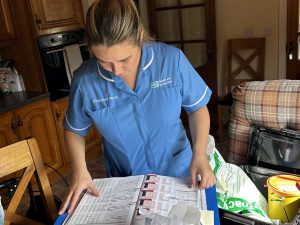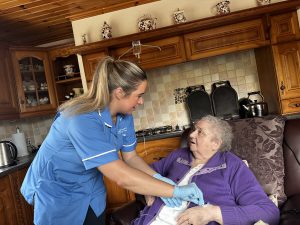3rd July 2024
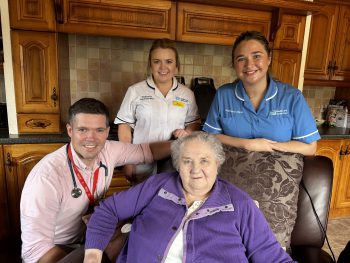
Maisie Megaw from Rathfriland is just one of the many patients who each day are now receiving hospital standard care in their own home across the Southern Trust.
Since it was set up, the ‘Acute Care at Home’ service has prevented over 12,000 hospital admissions and supported earlier discharge for more than 2000 people.
Acute Care at Home has been expanding across the Southern area since it was set up in 2014. Operating seven days a week from 8am to 11pm, they look after between 30 and 50 patients each day, around 18 of these from Newry and Mourne, who would otherwise have needed a hospital admission.
As the first Consultant Geriatrician led service of its kind in Northern Ireland, the team aims to respond to referrals from GPs, Northern Ireland Ambulance service, local hospitals, care homes and community specialist teams within just a few hours.
They have the same access to diagnostic and laboratory services as a hospital setting and can treat patients over the age of 65 with a wide range of acute illnesses in residential, nursing or their own homes. They have access to mobile diagnostic equipment, can take blood tests or organise other investigations and treat a range of conditions like chest infections, pneumonia or dehydration in patients’ own homes.
Mrs Megaw was referred to Acute Care at Home for treatment for cellulitis. She was treated by medical, nursing, physiotherapy, pharmacy and microbiology staff and received IV antibiotics and fluids, regular monitoring of blood markers and responded very well to treatment.
Maisie said: “I was just off the phone to my GP who was telling me that an Acute Care at Home team would be calling with me and they arrived at my door. From the first time they saw me right up until I was discharged I could not fault them. They were so attentive, at one stage I had them with me three times a day. They were very friendly and kind and the care I got was just terrific. I had doctors, nurses, physios, occupational therapists, pharmacists, everyone that I needed to help me came right to my door. I was just so appreciative that I did not have to go to hospital as I was able to recover in my own home with the help and dedication of all the amazing Acute Care at Home team.”
Maisie also praised the local District Nurses and Home care staff for their help with her recovery.
With additional staff recently recruited, referrals to the team have been increasing in the Newry and Mourne area. The team are working closely with GPs and the Northern Ireland Ambulance Service to encourage referrals and a geriatrician and specialist nurse are now based in Daisy Hill Hospital’s ED to offer more patients their support.
Dr Patricia McCaffery, Divisional Medical Director for Older People Services in the Southern Trust says: “A hospital admission can be traumatic and disruptive for anyone, particularly for an older person who may be less mobile, or for those who have dementia. There are also associated risks for patients from an unnecessary or longer hospital stay than is needed, for example infection, increased delirium and deconditioning muscle strength.
“Through the Acute Care at Home service, we are transforming the way we offer unscheduled care to our increasing number of older residents who are living with more complex needs. We hope that by offering high quality care in their own home environment, we will promote a better quality of life for our older population, avoiding stressful admissions and freeing up beds in our very busy acute hospitals when it is safe to do so.”
The Acute Care at Home team includes Consultant Geriatricians, Speciality Doctors, Specialist Nurses, Staff Nurses and Health Care Assistants, Pharmacists , Occupational Therapists, Physiotherapists, Speech and Language therapists, Dietitians and works closely with many other Community Services.
The team are continually developing their service to support as many patients as possible. Their new ‘virtual ward’ system is allowing them to continue to remotely monitor patients who have been discharged from acute care and no longer require face to face treatment, freeing up capacity to take more new admissions.





